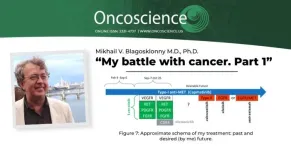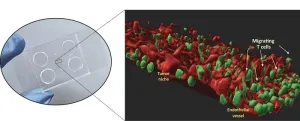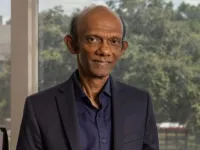Dr. Blagosklonny’s battle with cancer (Part 1)
2024-01-22
(Press-News.org)
On January 3, 2024, Mikhail V. Blagosklonny M.D., Ph.D., from Roswell Park Comprehensive Cancer Center published a new brief report in Oncoscience (Volume 11), entitled, “My battle with cancer. Part 1.”
“In January 2023, diagnosed with numerous metastases of lung cancer in my brain, I felt that I must accomplish a mission. If everything happens for a reason, my cancer, in particular, I must find out how metastatic cancer can be treated with curative intent. This is my mission now, and the reason I was ever born. In January 2023, I understood the meaning of life, of my life. I was born to write this article. In this article, I argue that monotherapy with targeted drugs, even when used in sequence, cannot cure metastatic cancer. However, preemptive combinations of targeted drugs may, in theory, cure incurable cancer. Also, I share insights on various topics, including rapamycin, an anti-aging drug that can delay but not prevent cancer, through my personal journey.”
Read the full paper: DOI: https://doi.org/10.18632/oncoscience.593
Correspondence to: Mikhail V. Blagosklonny
Emails: Blagosklonny@oncotarget.com, Blagosklonny@rapalogs.com
Keywords: lung cancer, brain metastases, capmatinib, resistance, MET
About Oncoscience:
Oncoscience is a peer-reviewed, open-access, traditional journal covering the rapidly growing field of cancer research, especially emergent topics not currently covered by other journals. This journal has a special mission: Freeing oncology from publication cost. It is free for the readers and the authors.
To learn more about Oncoscience, visit Oncoscience.us and connect with us on social media:
X, formerly Twitter
Instagram
Facebook
YouTube
LinkedIn
For media inquiries, please contact media@impactjournals.com.
Oncoscience Journal Office
6666 East Quaker Str., Suite 1D
Orchard Park, NY 14127
Phone: 1-800-922-0957, option 4
###
END
ELSE PRESS RELEASES FROM THIS DATE:
2024-01-22
In wave-making research recently published in Marine and Coastal Fisheries, a team of researchers, led by biologists at the University of Massachusetts Amherst, has quantified the rate at which great hammerhead sharks are eating Atlantic tarpon hooked by anglers at Bahia Honda, Florida—one of the prime tarpon fishing spots in the Florida Keys.
Called the “depredation rate,” the team found that 15.3% of tarpon that were hooked by anglers and fought for more than five minutes were eaten while still on the line. But the researchers also show that this is not necessarily a sign that the ecosystem is out of balance. To the contrary, increased reports ...
2024-01-22
Charles Darwin proposed that life could have emerged in a “warm little pond” with the right cocktail of chemicals and energy. A study from the University of Washington, published this month in Communications Earth & Environment, reports that a shallow “soda lake” in western Canada shows promise for matching those requirements. The findings provide new support that life could have emerged from lakes on the early Earth, roughly 4 billion years ago.
Scientists have known that under ...
2024-01-22
The exponential demand for high computing power is far exceeding the capabilities of current electronic systems; however, engineers at the University of Pittsburgh are shining a light on new solutions.
Nathan Youngblood, principal investigator and assistant professor of electrical and computer engineering at Pitt’s Swanson School of Engineering, received a $552,166 Faculty Early Career Development Award from the National Science Foundation (NSF) and a $449,240 award from the Air Force Office of Scientific Research (AFOSR) through its Young Investigator Program (YIP) to continue his pioneering work in phase-change materials and optical computing.
“Dr. ...
2024-01-22
Milano, January 22nd 2024 – It is only a few centimeters in size and can be held between two fingers, but in the micro-channels carved inside it, it’s hidden a three-dimensional and highly faithful model of a biliary tract cancer called cholangiocarcinoma, complete with its tumor microenvironment. This 3D model is built starting from a sample of patient’s cancer cells and thus it represents a patient-specific "organ-on-chip": a technology made possible only through a multidisciplinary approach that merges biomedicine, physics and engineering.
The innovative prototype is the result ...
2024-01-22
More than 11 million people in the United States take anticoagulation or antiplatelet medications, such as heparin or aspirin, to treat serious conditions like heart attack and stroke. However, these medications also put patients at risk of life-threatening bleeding in the case of injury or during surgery. To improve strategies for reducing blood loss, a team led by investigators from Brigham and Women’s Hospital, a founding member of the Mass General Brigham healthcare system, developed a porous material that maximizes blood absorption and effectively activates clotting mechanisms, even in patients on anticoagulation or ...
2024-01-22
New biomarkers with improved diagnostic performance for early detection of lupus nephritis have been discovered in the University of Houston lab of Chandra Mohan, a pioneer in lupus research. Early identification of renal involvement in lupus and prompt treatment are essential in reducing the pain, suffering and eventual mortality it causes.
Systemic Lupus Erythematosus (SLE), commonly called lupus, is an autoimmune disease that occurs when the body attacks its own tissues and organs. Inflammation from the disease can impact many different parts of the body including joints, skin, kidneys, blood cells, brain and heart. Lupus nephritis is one ...
2024-01-22
Motion capture technology has applications in a wide range of fields, including entertainment, medicine, and sports, to name a few. But what if the measurements these systems were based on were rooted in social practices and biased assumptions, leading to errors that become ingrained over time?
This question is at the heart of new research co-authored by Mona Sloane, an assistant professor of data science and media studies at the University of Virginia.
Sloane and her co-authors — Abigal Jacobs, an assistant ...
2024-01-22
Genetic changes or mutations can cause hereditary kidney disease, which can eventually lead to dialysis or the need for kidney transplantation. Identifying the cause of inherited kidney disease is the first step in identifying a treatment.
With that goal in mind, researchers at Wake Forest University School of Medicine and the First Faculty of Medicine of Charles University in Prague, Czech Republic, have discovered a new genetic cause of inherited kidney disease.
The findings were recently published in Kidney International.
According to Anthony J. Bleyer, M.D., ...
2024-01-22
MIT neuroscientists have found that the brain’s sensitivity to rewarding experiences — a critical factor in motivation and attention — can be shaped by socioeconomic conditions.
In a study of 12 to 14-year-olds whose socioeconomic status (SES) varied widely, the researchers found that children from lower SES backgrounds showed less sensitivity to reward than those from more affluent backgrounds.
Using functional magnetic resonance imaging (fMRI), the research team measured brain activity as the children played a guessing game in which they earned extra money for each correct ...
2024-01-22
During the past decade, there has been significant development of new sulfur containing compounds that are used in various industries, including pharmaceuticals and agricultural products. Sulfoximines, sulfonimidoyl fluorides and sulfonimidamides are types of sulfur-containing chemical compounds that have wide-ranging potential as therapeutic drugs. However, the synthesis process for these compounds is complex and has several limitations. In a new article published in Nature Chemistry, Moffitt Cancer Center researchers describe their ...
LAST 30 PRESS RELEASES:
[Press-News.org] Dr. Blagosklonny’s battle with cancer (Part 1)






